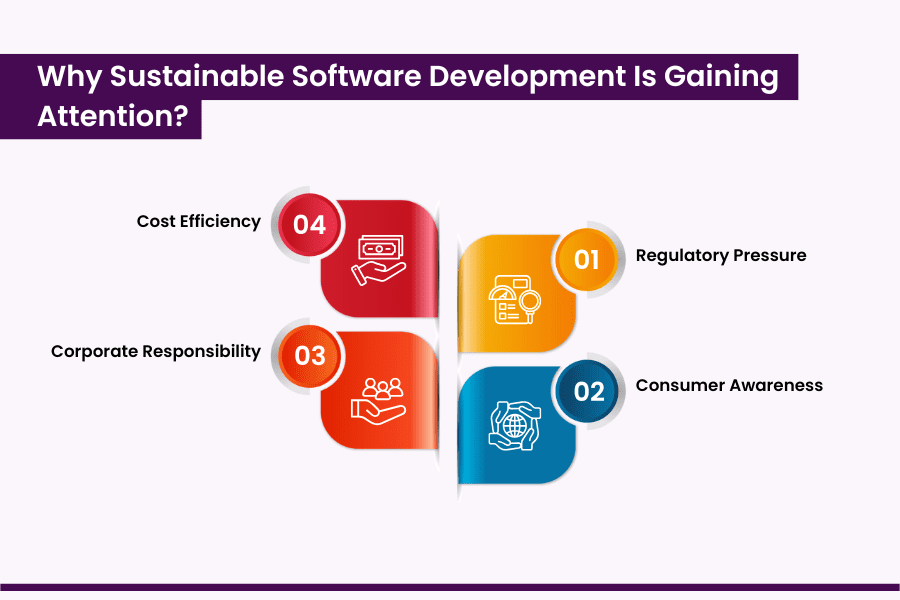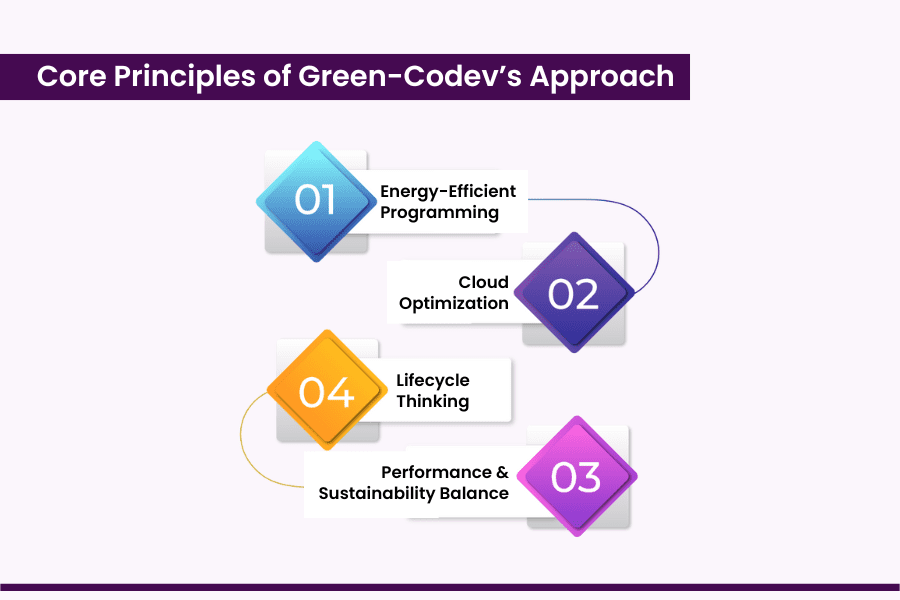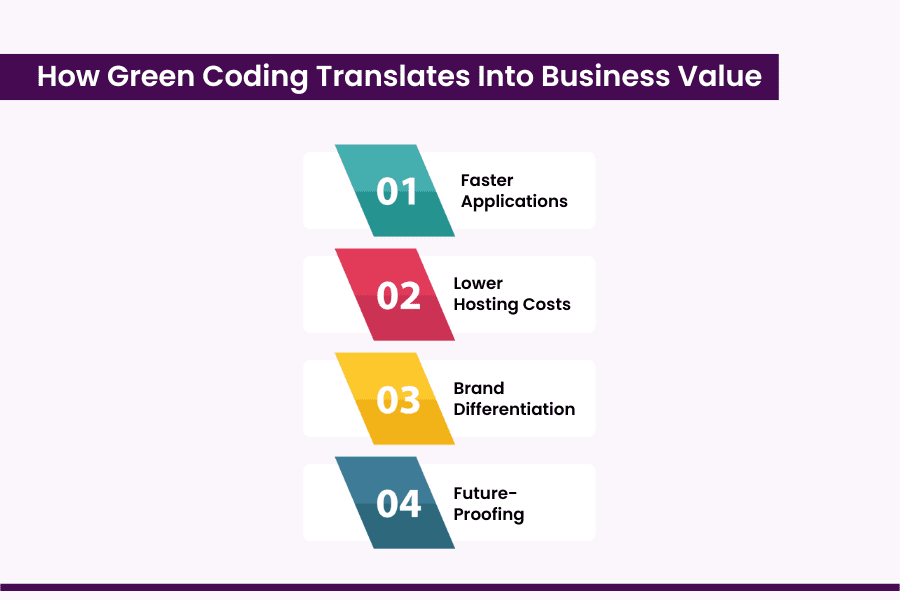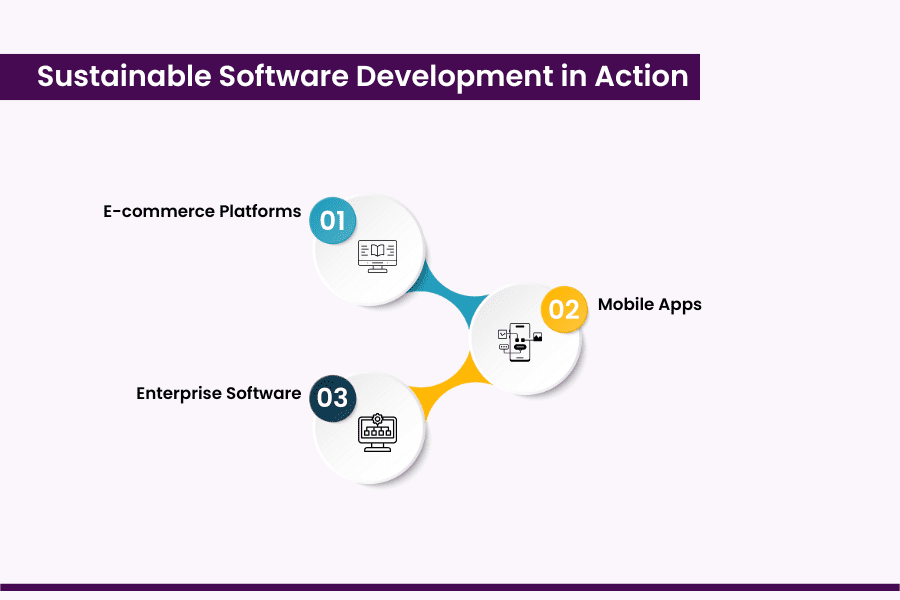
In a world increasingly aware of its environmental impact, the notion of building digital solutions in an eco-conscious manner has shifted from a niche to a necessity.
As industries worldwide pivot toward sustainability, the tech sector, which has long been considered insulated from resource constraints, is now reevaluating its energy usage. Here comes green coding, a holistic approach that redefines how software is built and operated. At the forefront of this shift is a forward-thinking software development company, Green-Code, championing energy-efficient programming and sustainable software development.
This blog explores how the principles of green coding not only align with global ecological goals but also deliver smarter custom software solutions that future-proof both business and planet.
- The Root Cause: The Need for Green Coding
- What Is Green Coding?
- Why Sustainable Software Development Is Gaining Attention?
- Core Principles of Green-Code’s Approach
- How Green Coding Translates Into Business Value
- Sustainable Software Development in Action
- Green Software Technology: The Future is Now
- The Takeaway: Writing the Future in Green
- Frequently Asked Questions
The Root Cause: The Need for Green Coding
Data centers already account for a significant share of global electricity consumption, and the demand is only rising. Every time we load a web page, stream a video, or run a cloud-based app, servers load in the background and consume power.
The complexity of software directly influences the amount of energy that is required to run it. Inefficient code can push energy demands higher, while streamlined, optimized code can significantly reduce them.
This is why energy-efficient programming is no longer just a niche-specific concern; instead, it’s becoming a core competency for any forward-thinking software development company or those who aspire to launch themselves via a sustainable digital presence. The shift toward green coding isn’t just about meeting environmental goals, but also it’s about creating faster, more efficient, and future-ready applications. However, on understanding the vision behind the launch of green-coding, are you well aware of this resource? Let’s have a look!
What Is Green Coding?
Green coding refers to the process of designing, writing, and maintaining code in ways that reduce IT waste, minimize energy consumption, and lower greenhouse gas emissions tied to computing infrastructure.
Unlike conventional software development, where speed and features dominate, green coding emphasizes logic, resource-efficient algorithms, and environmentally aligned architectural decisions. It focuses on:
- Optimizing algorithms to reduce CPU cycles and power draw.
- Using efficient data structures to speed up processing.
- Reducing the memory footprint to lower hardware strain.
- Leveraging energy-aware cloud infrastructure to cut carbon emissions.
By applying these principles, developers create green software that not only meets client needs but also aligns with sustainability goals. This shift is already influencing how custom software development services are delivered, ensuring that performance and eco-responsibility go hand in hand. But why has sustainable software development become strongly influential and a need of the time in the tech industry? Let’s explore the reasons behind it.
Why Sustainable Software Development Is Gaining Attention?

The tech world is currently not only working on future requirements but also developing a sustainable approach to them. One of those resources is Green-code, a sustainable software development approach. Multiple factors are driving the rise of this format, and some of the primary reasons are:
1. Regulatory Pressure
Governments are setting stricter emission targets, pushing businesses to adopt greener practices across operations, including software. As per resources, “enterprise IT currently accounts for 1% of greenhouse gas (GHG) emissions, and without intervention, this could scale to 14% by 2040, driven by data center and AI growth”.
2. Consumer Awareness
Users are becoming more conscious of the environmental impact of their digital habits. Hence, along with being aware, they prefer to invest more in sustainable tech resources, which also meet their demands.
3. Corporate Responsibility
Companies are embedding sustainability into their brand identity, making green software a strategic choice. Hence, they are investing more in strategic approaches that reduce their energy consumption and hardware waste and also contribute to sustainable, eco-friendly choices.
4. Cost Efficiency
Energy-efficient programming reduces operational costs in the long run, offering a business advantage, making Green-Code not only strategic but also a smarter approach for the modern tech challenges.
But with all the benefits associated with green coding, it is essential to ensure that they eventually meet your expectations or not. Hence, let’s dive deeper into its core principles, which define whether this technology is designed with not just a strategic approach but also a smarter methodology.
Core Principles of Green-Code’s Approach

Being such a robust foundational approach in the sustainable coding industry that emphasizes minimal energy consumption, here are the grounds that led to its execution:
- Energy-Efficient Programming
Every line of code is optimized for minimal energy usage. Instead of defaulting to resource-heavy frameworks, the green-code experts select tools and architectures that are lean and efficient.
- Cloud Optimization
Green-Code leverages cloud services that operate on renewable energy sources, aligning hosting choices with environmental responsibility.
- Lifecycle Thinking
Sustainability is built into every stage, from ideation and custom software development to deployment and ongoing maintenance.
- Performance & Sustainability Balance
The top green coding development companies, like Soluzione, understand that software must meet real-world demands without overburdening infrastructure or energy systems.
How Green Coding Translates Into Business Value

If you are intrigued by the latest coding format and yet are not aware of how it adds business value to your presence, then here is all you need to know:
- Faster Applications
Lean code means shorter load times and smoother user experiences.
- Lower Hosting Costs
Reduced processing needs translate to lower server expenses.
- Brand Differentiation
Businesses adopting green software stand out in a market that values corporate responsibility.
- Future-Proofing
Aligning with environmental goals ensures compliance with future regulations.
Hence, for businesses seeking custom software development services, partnering with a company that offers exceptional Green-Code means they don’t have to choose between innovation and sustainability; they get both.
Sustainable Software Development in Action

Green Code development not only allows businesses to acquire a sustainable development solution but also an effective implication of a future-secured digital platform. In fact, sustainable software development with Gree-Code can significantly contribute to diverse industries like:
1. E-commerce Platforms
Optimized product image delivery and caching to reduce server load.
2. Mobile Apps
Code that limits background processes to save battery life and server requests.
3. Enterprise Software
Efficient database queries that cut processing time and energy use.
This approach isn’t only relevant to theories, but it’s also a practical shift in how software development services are delivered. The future doesn’t revolve only around technological goods but will also prioritize eco-conscious interests. Let’s have a brief overview of it.
Green Software Technology: The Future is Now
The beauty of green software technology is that it doesn’t require a complete industry revamp; rather, it can be integrated into existing workflows. Whether it’s a custom software development project for a startup or enterprise-level custom software solutions, green coding techniques can be embedded from day one in both frameworks. Some of the most promising trends include:
- AI-driven code optimization to automatically reduce energy consumption.
- Serverless architecture ensures resources are only used when needed.
- Hybrid cloud strategies powered by renewable energy sources.
Because these advancement in the coding industry not only aims for sustainable development but also aspire to achieve the desired results for both the newbies and the established businesses in the digital market. Because that’s what the future is about!
The Takeaway: Writing the Future in Green
With leaders like Green-Code setting the standard, sustainable software development is moving from niche to norm. By embracing green software technology and energy-efficient programming, companies can create digital products that are as kind to the planet as they are to the user.
The choice is no longer between performance and sustainability when, with the right custom software solutions, you can have both. And that’s where Soluzione enters the frame, your perfect partner for the best Green-Code services.
The next time you think about custom software development services, consider not just what the software can do, but how it’s built. After all, the future of technology should be green, inside and out. Wondering how we can help you in this? Connect with our professionals now!
Read More: https://www.solzit.com/blog/
Frequently Asked Questions
How does sustainable software development benefit businesses?
Sustainable software not only has ecological benefits but also reduces operational costs through energy efficiency, enhances hardware timelines, and improves brand reputation by aligning with environmental goals. It eventually meets the growing consumer demands for eco-conscious products.
What are some key principles of Green-Code practices?
Some key principles of Green-Code practices are:
- Writing clean, efficient, and optimized code
- Reducing computational complexity
- Minimizing unnecessary data transfers and storage
- Leveraging renewable-powered hosting solutions
- Regularly refactoring code for performance improvements
Can Green-Code approaches impact software performance or efficiency?
Absolutely, in most cases, optimizing code for sustainability also improves performance by reducing resource usage, making applications faster, lighter, and more responsive.
Are there industry standards or certifications for Green-Code practices?
While they are still emerging, standards like the Sustainable IT standards (ISO/IEC 30100 series) and certifications such as B Corporation, Energy Star for Data Centers, and Green Software Foundation guidelines are increasingly being adopted in the industry.










